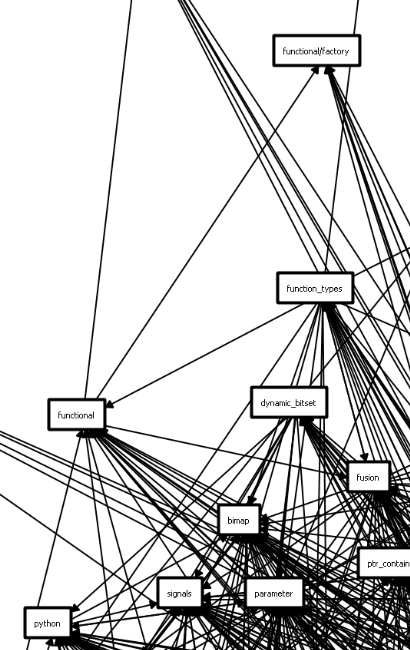Boost Dependency Analyzer -- Jens Weller

Boost Dependency Analyzer
by Jens Weller
I have something special to announce today. A tool I've built over the last 2 weeks, which allows to analyze the dependencies in Boost...
Two-minute video:
March 11-13, Online
March 16-18, Madrid, Spain
March 23-28, Croydon, London, UK
March 30, Kortrijk, Belgium
May 4-8, Aspen, CO, USA
May 4-8, Toronto, Canada
June 8 to 13, Brno, Czechia
June 17-20, Folkestone, UK
September 12-18, Aurora, CO, USA
November 6-8, Berlin, Germany
November 16-21, Búzios, Rio De Janeiro, Brazil
By Blog Staff | Aug 1, 2013 07:10 AM | Tags: boost

Boost Dependency Analyzer
by Jens Weller
I have something special to announce today. A tool I've built over the last 2 weeks, which allows to analyze the dependencies in Boost...
Two-minute video:
By Blog Staff | Jul 31, 2013 03:03 PM | Tags: None

HPX V0.9.6 Released
The STE||AR Group is proud to announce the sixth formal release of HPX (V0.9.6). ...
From the announcement:
In this release we have made several significant changes:
- Consolidated API to be aligned with the C++11 (and the future C++14) Standard
- Implemented a distributed version of our Active Global Address Space (AGAS)
- Ported HPX to the Xeon-Phi device
- Added support for the SLURM scheduling system
- Improved the performance counter framework
- Added a distributed version of the Active Global Address Space (AGAS)
- Added parcel (message) compression and parcel coalescing systems
- Allow different scheduling polices for different parts of code with experimental executors API
- Added experimental security support on the locality level
- Created a native transport layer on top of Infiniband networks
- Created a native transport layer on top of low level MPI functions
- Added an experimental tuple-space object
By Blog Staff | Jul 29, 2013 01:26 AM | Tags: None

Note that some of these concurrent collections are also currently being proposed for ISO standardization.
From the announcement:
Intel Releases New Version of Intel® Concurrent Collections for C++
Intel released a new version of Intel® Concurrent Collections for C++, a library that helps developers write and tune parallel software. Now with Version 0.9, computers powered by Intel® Xeon Phi™ co-processors are supported and can experience unified programming in the same seamless way that single Intel multi-core workstations and clusters of workstations have experienced with earlier versions. Additionally, its tuning layer was extended, giving developers even easier control over the execution of their application, offering greater potential for performance, scalability and productivity.
Intel Concurrent Collections for C++ is available for Windows and Linux as a free download through the Intel Software Network.
By marshall | Jul 1, 2013 10:22 AM | Tags: intermediate boost advanced
Release 1.54.0 of the Boost C++ Libraries is now available.
These open-source libraries work well with the C++ Standard Library, and are usable across a broad spectrum of applications.
The Boost license encourages both commercial and non-commercial use.
This release contains five new libraries and numerous enhancements and bug fixes for existing libraries.
New Libraries:
Log: Logging library, from Andrey Semashev.
TTI: Type Traits Introspection library, from Edward Diener.
Type Erasure: Runtime polymorphism based on concepts.
For details, including download links, see http://www.boost.org/users/news/version_1.54.0
You can also download directly from SourceForge: http://sourceforge.net/projects/boost/files/boost/1.54.0/
To install this release on your system, see http://www.boost.org/doc/libs/release/more/getting_started/index.html
Thanks,
--The Boost release team
By marshall | Jun 17, 2013 04:23 PM | Tags: None
 You can download either the source or prebuilt executables from the LLVM web site
You can download either the source or prebuilt executables from the LLVM web site
Clang 3.3 includes full C++11 support, as well as a suite of run-time checkers to help find bugs in your programs.
For more information, check out the release notes for LLVM and for Clang
By seth | May 31, 2013 11:09 AM | Tags: None
 The release of GCC 4.8.1 was announced today (31 May 2013) on the gcc mailing list. In addition to many bug fixes, GCC 4.8.1 adds support for C++11 ref-qualifiers, the final missing C++11 feature. This makes GCC the first C++11 [Ed.: language specification] feature complete compiler to be released.
The release of GCC 4.8.1 was announced today (31 May 2013) on the gcc mailing list. In addition to many bug fixes, GCC 4.8.1 adds support for C++11 ref-qualifiers, the final missing C++11 feature. This makes GCC the first C++11 [Ed.: language specification] feature complete compiler to be released.
Information on the full set of changes is available on the GCC 4.8 series page.
 Clang 3.3, also C++11 feature complete, is in release testing and the release is currently scheduled for June 5th. Within a week full C++11 support will be available from two major compilers and on numerous platforms supported by those compilers.
Clang 3.3, also C++11 feature complete, is in release testing and the release is currently scheduled for June 5th. Within a week full C++11 support will be available from two major compilers and on numerous platforms supported by those compilers.
Forging ahead with support for the next C++ standard.
By Blog Staff | Apr 20, 2013 04:34 AM | Tags: None
 Reported via Twitter by ISO C++ project editor Stefanus Du Toit:
Reported via Twitter by ISO C++ project editor Stefanus Du Toit:
Clang is C++11 feature complete as of *just now*! Here's the final commit by Richard Smith: http://llvm.org/viewvc/llvm-project?view=revision&revision=179858 … #llvm #cxx11
With Richard Smith's commit to finish thread_local support, Clang is now believed to be code-complete for full C++11 support.
As Clang usually releases twice a year, industry observers expect this means we will see at least one fully C++11-conforming commercial compiler available in the marketplace by this summer.
Congratulations, Clang development team!
By Blog Staff | Mar 25, 2013 11:08 AM | Tags: None

Enable C++11 support on Android
How do I integrate C++11 in Android in order to use
unordered_map(the new version ofhash_map)?
By Blog Staff | Mar 24, 2013 02:07 PM | Tags: None

Qt Creator 2.7.0 Released
by Eike Ziller
C++ support in Qt Creator got even more improvements for C++11, like handling of
alignof,alignasand noexcept, brace initializers, and more lambda fixes. Also, if Qt Creator cannot find out if your tool chain expects C++11 or C++98/03, it defaults to C++11 now, for a better out of the box experience.
By Blog Staff | Mar 24, 2013 11:46 AM | Tags: None
 It's nice to see more C++ compilers being written in C++ rather than C. The Clang compiler is already all-C++. In recent years GCC has been slowly doing the same -- first compiling the C code as C++ code, and more recently using C++ itself.
It's nice to see more C++ compilers being written in C++ rather than C. The Clang compiler is already all-C++. In recent years GCC has been slowly doing the same -- first compiling the C code as C++ code, and more recently using C++ itself.
Here is a readable summary of progress to date.
GCC's Move to C++
by Linda Jacobsen
Excerpt:
In 2008, 2009, and 2010, (i.e., at the beginning and after each milestone) Taylor provided formal plans for the next steps. There is no formal plan going forward from here. People will use C++ constructs in future patches as they deem necessary, but not just for the sake of doing so. Some will limit their changes to the times when they are patching the code anyway. Others approach the existing C code with an eye to converting code to C++ wherever it makes the code clearer or more efficient. Therefore, this is an ongoing effort on a meandering path for the foreseeable future.